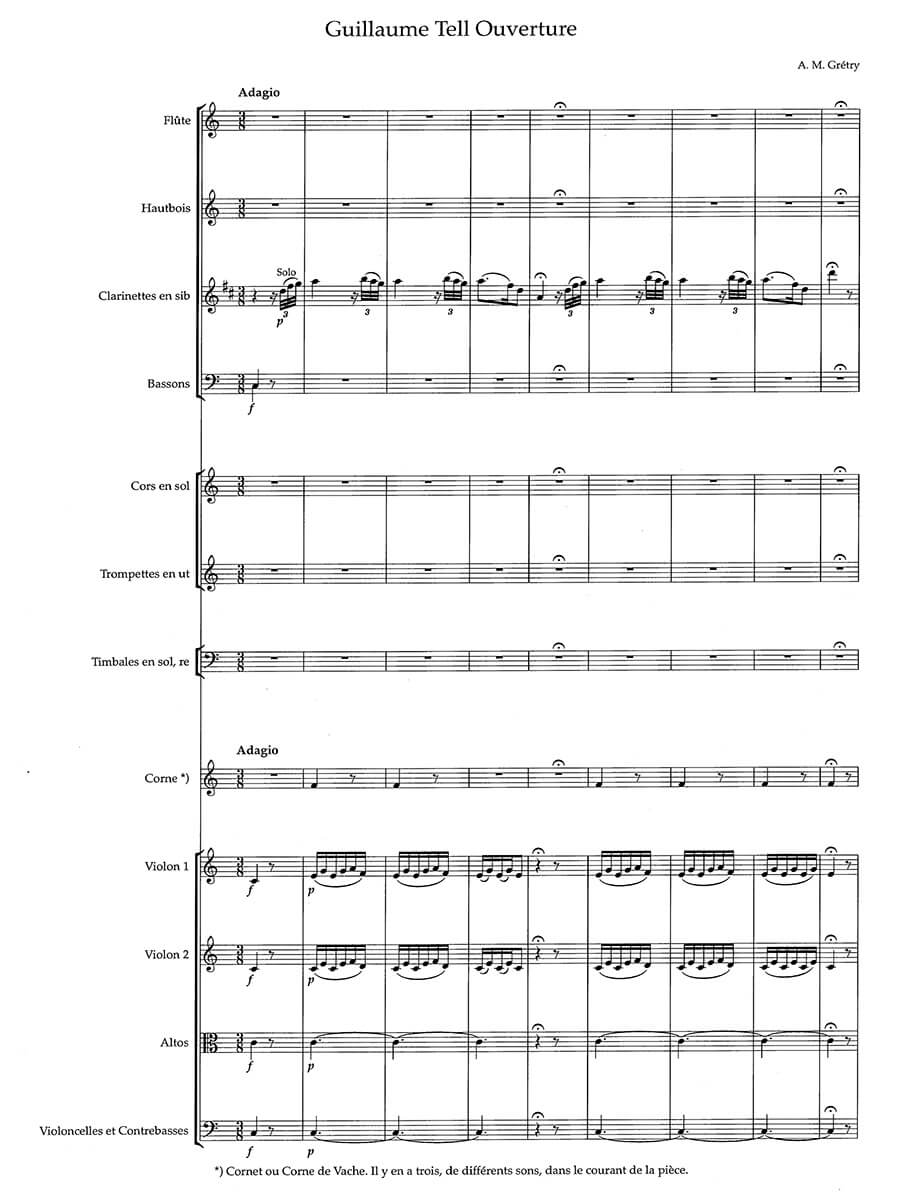Ouverture to Guillaume Tell
Grétry, André
18,00 €
Preface
André-Ernest-Modeste Grétry – Overture to Guillaume Tell
(b. Liège, 11 February 1741 – d. Montmorency, 24 September 1813)
(1791)
Composed in 1791; première: 9 April 1791 in Paris, Salle-Favart of the Comédie-Italienne
Printed by Le Duc, Paris 1791; second version edited by Henri-Montan Berton, Paris, A. Petit 1828; libretto by Michel-Jean Sedaine: Libraire Maradan, Paris l’an II (1793).
Preface
Grétry was one of the most important French composers in the second half of the 18th century. Born in Liège, he studied in Rome before travelling to Paris via Geneva in 1767, where he soon enjoyed his first successes. Above all, he left his mark on the Opéra-comique. His pupil Sophie de Bawr praised him for having “accomplished in comedy the revolution that Gluck had recently brought about in lyric tragedy. … Instead of the vague, languid and incoherent chants which had hitherto characterised the French school, one now heard enchanting melodies so perfectly connected with the words that everyone who remembered the situations of the play immediately recalled some of Grétry’s notes, and that is perhaps the greatest praise that can be bestowed on a dramatic work. “ 1
Grétry sympathised with the revolution: “I undoubtedly owe my love of freedom and abhorrence of slavery to the republican sentiments I absorbed from childhood. “2 The “Drame” Guillaume Tell is also about the revolt of the people against a despot, just as the French had rebelled against aristocratic rule in 1789. For family reasons, he spent these years in Lyon, his wife’s home town, where he completed the score in 1791.
Here, as in most of his works, the overture is of particular importance. His friend Jean Nicholas Bouilly, who was with him at the time and to whom Grétry was one of the first to play the piece, reports: “He took great importance to the introduction to his works. He believed that the composer should concentrate above all on preparing his listeners for the emotions he wanted to arouse in them, announcing to them the place, the time and almost all the characters of the action to be performed before them. “The overture to an opera,” he said, “is like the preface to a good book, which prepares the reader to read it with interest, and promises pleasure to mind and heart.“3 In this sense, the overture takes up aspects of the opera plot in order to place them in a musical context. In doing so, Grétry broke away from the usual formal conventions of the 18th century right from the start.4 The score quotes the stage directions from Sedaine’s libretto, so that a close relationship between overture and drama is revealed from the outset, especially as it is played in front of an open curtain. The stage shows “the mountains of Switzerland, the dawn; a little shepherd, the son of William Tell, can be seen on the top of a rock in the distance, playing the ‘Rhans des vaches’ [the cow dance]. Between the two mountains, you can see the shepherds of the cows passing by. “5 The “Ranz des vaches” is heard right at the beginning, as Rousseau presents it in his Dictionnaire as “a song that is famous among the Swiss and that the young herdsmen play on the bagpipe while herding the cattle in the mountains”.6 In his memoirs, Grétry emphasises that he borrowed the characteristic music from Swiss soldiers: “When I was writing my music for William Tell in Lyon, […] I asked the colonel of a Swiss regiment that was garrisoned there, to bring me together with the officers of his corps for lunch. Over dessert, I told the gentlemen that I was just about to compose the poem about their old compatriot William Tell and asked them to sing me songs from that time and other Alpine songs that were most characteristic. They sang several to me, and without knowing that I had written any of them down, I tuned myself into the old Swiss tone in such a way that both the Swiss and the musicians were still satisfied with the Swiss rural tone in this work of mine. …
read more / weiterlesen … > HERE
Score Data
| Score Number | 4836 |
|---|---|
| Edition | Repertoire Explorer |
| Genre | Overture |
| Pages | 40 |
| Size | 210 x 297 mm |
| Printing | Reprint |
